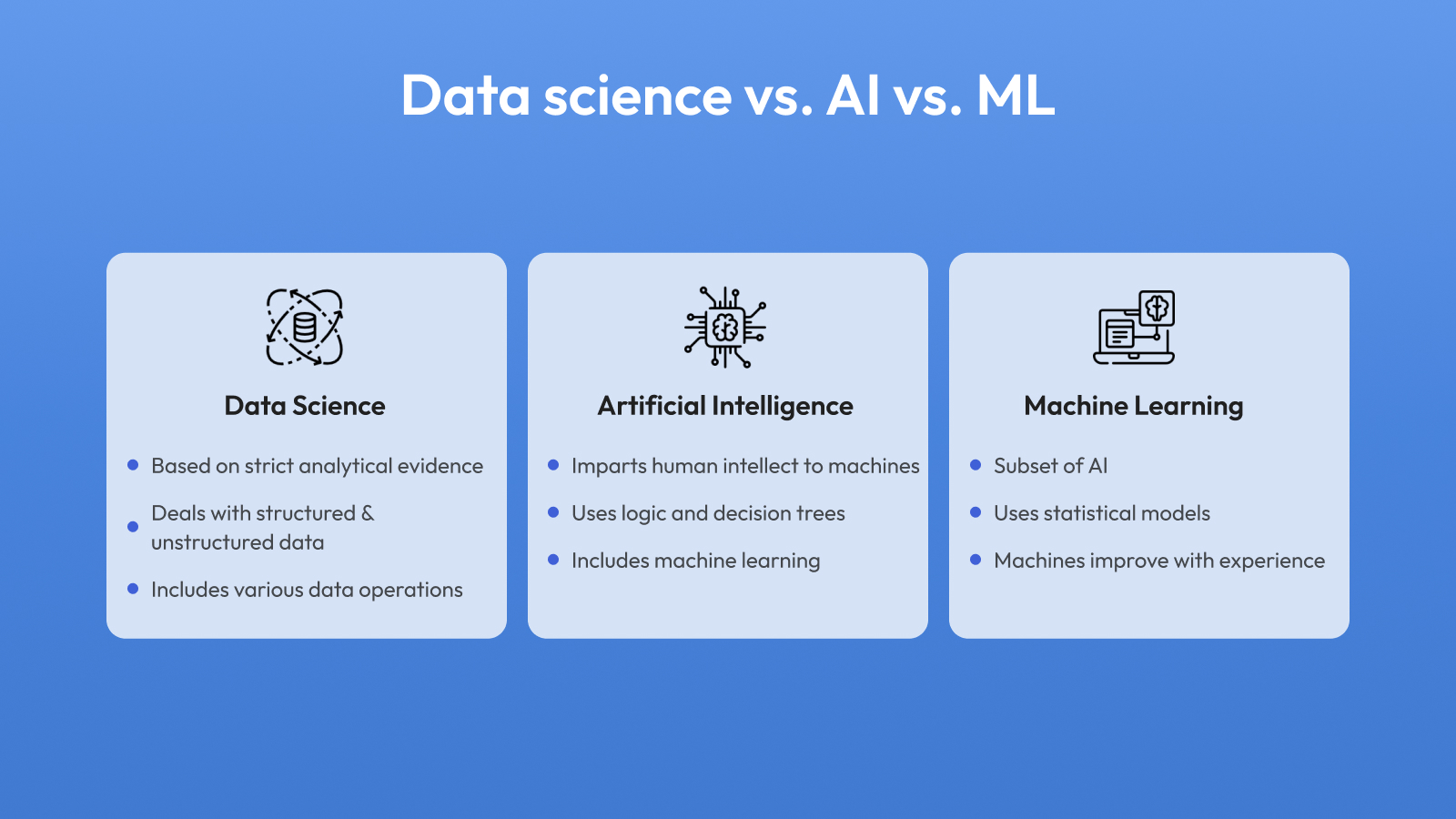
AI, Machine Learning, and Data Science: The Key to Unlocking Business Success
Data science, machine learning, and artificial intelligence are commonly discussed topics in the modern world, and there is occasional confusion around the use of these terms interchangeably. Treating them that way is wrong, and can lead to misunderstandings about their distinct roles in the technological landscape.
This post will explain why, taking a deep dive into the differences between data science, machine learning, and artificial intelligence. While all three are linked together, each plays a specific and crucial part in the ever-evolving world of technology.
Data Science: The Key to Unlocking Business Insights
Data Science relies on rigorous analytical evidence and handles both structured and unstructured data. Moreover, it encompasses everything related to data selection, preparation, and analysis. DS also enables the extraction of valuable insights and information from vast amounts of data.
For what purpose is it utilized?
- Strategic improvement of processes for marketing campaigns and business operations
- Projected analytics to provide insights on anticipated demand and upcoming events
- Recommendation systems, such as those used by Amazon and Netflix
- Automated decision-making systems such as face recognition technology and drones
- The process of social research involves the collection and analysis of questionnaire data
For example, Netflix utilizes its data mines to analyze viewing patterns. This enables staff to gain a better understanding of users’ interests and make informed decisions on future Netflix series. By analyzing similar data, entrepreneurs can also leverage business intelligence tools to start a streaming service tailored to a specific niche or audience, maximizing their chances of success in a competitive market.
The person responsible for implementing data science is a data scientist who has a deep understanding of data insights and numerical analysis. Data scientists may also require knowledge in areas such as simulations, quality control, computational finance, industrial engineering, and number theory.
The Essence of Artificial Intelligence
Advancements in artificial intelligence have transformed our daily lives and professional environments. AI refers to the ability of machines, particularly computer systems, to mimic human intelligence processes. Through programming, these machines can analyze data, learn, and make decisions based on algorithms.
AI is utilized for various functions, including powering virtual assistants like Siri and Alexa, with the goal of granting machines human-like intelligence. It is versatile, encompassing everything from chess apps to speech recognition systems. For instance, the Amazon Alexa voice assistant is capable of recognizing speech and responding to questions due to AI capabilities.
How Machine Learning is Changing the Business Landscape
Machine learning is a branch of artificial intelligence where computers learn and adapt like humans, constantly refining their skills autonomously. The generic algorithm of ML uses input data to generate logic without the need for manual coding. Machine learning improves programming scalability and speeds up result production. Programming is viewed as an automation process, while machine learning is seen as a higher level of automation.
Machine learning is used by companies for different purposes. For instance, Netflix uses predictive analytics to improve user recommendations. This encourages users to interact more with their service. Recommendations are personalized based on user preferences through machine learning algorithms.
How to Differentiate Data Science, AI and ML?
 Data science, artificial intelligence (AI), and machine learning are three terms that are often used interchangeably, but they actually refer to distinct concepts within the realm of technology and data analysis. Understanding the differences between these terms can help clarify their roles and applications in various industries.
Data science, artificial intelligence (AI), and machine learning are three terms that are often used interchangeably, but they actually refer to distinct concepts within the realm of technology and data analysis. Understanding the differences between these terms can help clarify their roles and applications in various industries.
Data science is a broad field that encompasses the collection, processing, and analysis of large sets of data to extract valuable insights and inform decision-making. Data scientists use a combination of statistical analysis, data mining, and machine learning techniques to uncover patterns and trends within data sets. They are responsible for cleaning and organizing data, creating predictive models, and communicating their findings to stakeholders.
AI is a branch of computer science that focuses on creating systems that can perform tasks typically requiring human intelligence, such as speech recognition, decision-making, and problem-solving. AI systems are designed to simulate human cognitive functions and learn from experience, with the goal of enabling machines to make autonomous decisions and improve their performance over time.
Machine learning is a part of artificial intelligence (another called AI) that concentrates on creating algorithms and models to enable computers to learn from data without explicit programming. These algorithms utilize statistical techniques to recognize data patterns and make predictions or decisions based on those patterns. By training on large data sets, these algorithms can enhance their accuracy and performance over time.
Wrapping up
As you can find out, data science is focused on collecting and analyzing data to extract insights, AI is focused on creating systems that can perform tasks requiring human intelligence, and machine learning is a subset of AI that focuses on developing algorithms to learn from data. While these concepts are related and often work together, they each have distinct roles.
We’ve outlined to you the essence of the know-hows like AI, machine learning and data science for different businesses. If you need to know more about them in order to automate your company flows, you can contact the skilled software development vendor. The vendor’s experts can provide a comprehensive data strategy tailored to your specific needs, whether it’s optimizing marketing campaigns, streamlining internal processes, or even leveraging machine learning to develop a powerful recommendation engine to personalize your customer experiences.